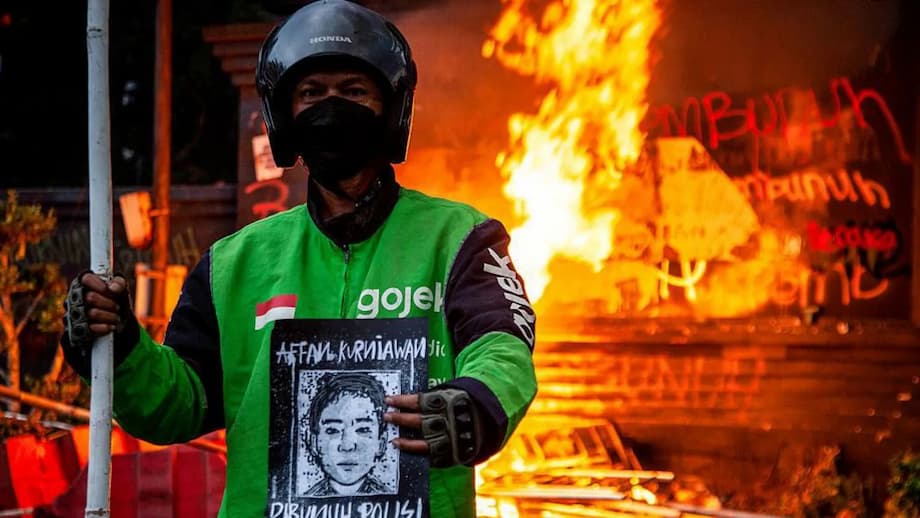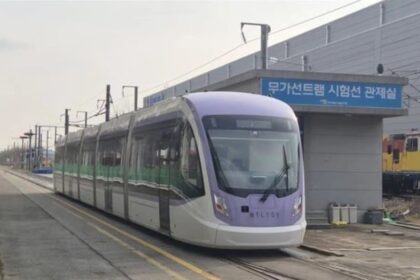What sparked the nationwide unrest
The death of 21 year old delivery driver Affan Kurniawan under the wheels of a police armoured vehicle beside Indonesia’s national parliament shocked the country and detonated a wave of protests from Jakarta to Bali and Sulawesi. Demonstrators had gathered to rail against lawmaker perks and daily economic strain. Within hours of the fatal incident, anger turned into street clashes, burning buildings and a nationwide crisis for President Prabowo Subianto.
By early week counts, at least eight people had died in the unrest, with some tallies reaching ten, and hundreds were injured. Police reported more than 1,200 arrests in the first days of the crackdown, a figure that rose above 1,600 in later police tallies, while rights groups and local officials logged dozens missing. Region after region reported damage as mobs ransacked regional parliament offices and some politicians homes, and as riot police used water cannons and tear gas to disperse crowds.
The spark was a new housing allowance for all 580 members of the House of Representatives, set at 50 million rupiah a month, nearly ten times the Jakarta minimum wage. Reports in local media also put total monthly compensation for lawmakers, including other benefits, at more than 100 million rupiah. That figure landed at a moment of rising prices, higher taxes and a slowing job market, after cuts to education, health and public works budgets. The contrast between belt tightening for citizens and upgraded benefits for officials set the stage for a broader reckoning.
A day after the protests began, Kurniawan was riding to complete a food order near the legislature. Witness accounts and video from the scene show an armoured vehicle from the National Police Mobile Brigade unit (Brimob) striking him and then rolling over his body as it accelerated through a crowd. The capital’s police chief later confirmed a Brimob vehicle killed the 21 year old, who worked gigs for Gojek and Grab. The episode quickly became a symbol of unaccountable power and everyday vulnerability.
The funeral drew riders, activists and officials. Candlelight vigils spread, and hashtags like ResetIndonesia trended as students and gig workers organized new marches. TikTok paused its live streaming feature in Indonesia for several days in an effort to limit real time calls to gather.
A young worker killed in Jakarta
Kurniawan was not a protest organizer. He was caught between police and demonstrators outside the House of Representatives while trying to earn a living. Reporting from the scene described the Brimob car speeding through the crowd and hitting him, and instead of stopping, the vehicle running over him. The tragedy tapped into a much older grievance about heavy handed policing, arbitrary arrests and lack of accountability.
President Prabowo Subianto apologized to the family and ordered an investigation. Jakarta police named seven Brimob personnel linked to the incident, including the driver and the unit commander, as subjects of internal and criminal probes. The president promised financial support for the family as the legal process gets under way.
Why anger exploded over pay and privilege
Indonesia’s parliament has long been criticized for rich benefits and low public trust. The new housing allowance crystallized those complaints into a single number that people could compare to their own paychecks. Many Indonesians say they are squeezed by rising food, rent and transport costs while wages stagnate. University students, labor groups and riders who deliver meals or parcels say they see leaders insulated from the same shocks.
Dr Eve Warburton of the Australian National University noted that the pay and allowance story intersected with growing economic insecurity. She argued that a perception of a wealthy political class, protected from downturns while asking citizens to accept cuts, pushed people onto the streets. Vedi Hadiz of the University of Melbourne said elites appear cloistered in a life of comfort, which offends a widespread sense of fairness.
Public anger deepened after several lawmakers dismissed the criticism as uninformed or mocked protesters online. In Jakarta, angry crowds later looted luxury goods from some legislators homes. The protest coalition also widened. The student group Gejayan Memanggil highlighted what it called policies favoring conglomerates and the military, and the growing role of officers in civilian posts.
How the protests spread and turned deadly
What began as rallies outside the national parliament spread to at least 32 of Indonesia’s 38 provinces within days, according to local and international reports. Cities that saw clashes included Jakarta, Surabaya, Bandung, Yogyakarta, Solo, Cirebon and Semarang on Java, Makassar and Gorontalo on Sulawesi, Palembang on Sumatra, Banjarmasin on Borneo, and parts of Papua. Even Bali and Lombok, often insulated from mainland turmoil, experienced vandalism and arrests.
In Makassar, a regional legislature building went up in flames, trapping people inside. At least three died there. The Guardian reported the death of a student in Yogyakarta during clashes with riot police, and the death of a 60 year old pedicab driver in Solo after exposure to tear gas. Police stations and local government offices were attacked in several cities. In Surabaya, protesters stormed parts of the police headquarters compound and destroyed property. In Jakarta, mobs targeted officials homes after groups posted personal details online.
Authorities said the death toll stood at eight in early counts. Channel NewsAsia later cited police oversight officials reporting ten deaths, more than 1,680 arrests and at least 20 missing people nationwide. City and provincial leaders tallied extensive damage. Losses approached 900 billion rupiah in the hardest hit regions, including East Java and South Sulawesi. Financial markets wobbled, with the Jakarta index dropping more than 3 percent at one point before recovering part of the loss.
Government response and security tactics
Confronted by spreading unrest, President Prabowo canceled a planned trip to China and delivered a mixed response. He announced cuts to lawmakers perks, including shrinking the housing allowance and imposing a moratorium on overseas trips. At the same time, he ordered police and the military to take firm action against arson, looting and attacks on public facilities. Security forces set up city wide checkpoints, carried out joint patrols, used tear gas and water cannon, and in Jakarta deployed snipers at key intersections. Commanders also discussed turning off street lights in protest zones at night and using rubber bullets to break up crowds.
Speaking about the violence and the looting of officials homes, Prabowo told security forces to go hard within the law.
There are signs of unlawful acts, even leading to treason and terrorism. I have ordered them to take action as firm as possible against the destruction of public facilities, looting at homes of individuals and economic centres, according to the laws.
Investigations into Kurniawan’s death advanced. The National Police Commission (Kompolnas) recommended internal ethics trials and criminal charges for seven Brimob officers, including the driver and the unit commander, and placed them in special detention. Kompolnas commissioners said both processes should run together so the public can watch justice move.
Kompolnas Commissioner Mohammad Choirul Anam urged parallel proceedings.
Both ethics and criminal proceedings must run in parallel to ensure transparency and justice.
Rights groups and the United Nations pressed Jakarta to rein in force and investigate. Human Rights Watch accused authorities of treating demonstrations as treason rather than civic action, echoing concerns over a long record of excessive force at protests. Meenakshi Ganguly, the Asia director at Human Rights Watch, warned about the way the government framed the unrest.
The authorities have acted irresponsibly by treating the protests as acts of treason or terrorism.
Prabowo political test
Prabowo Subianto, a former special forces commander and onetime son in law of autocrat Suharto, won the presidency in 2024 after courting young voters on TikTok and promising prosperity. His past includes allegations of human rights abuses in the late Suharto era. That history, and the central role students played in forcing Suharto out in 1998, frames the stakes as campuses organize again.
Dr Eve Warburton, director of the Indonesia Institute at the Australian National University, said the crisis will measure his ability to calm the streets without sliding into repression.
It’s a major test. Can he placate the protesters and bring an end to rolling demonstrations, while not resorting to excessive state violence or repression?
His choice of tools matters. Heavy force could quiet the streets short term and deepen anger long term. Narrow concessions on benefits may buy time but will not answer broader calls for transparency, fair opportunity and police reform.
Social media, student networks and the streets
The movement has been coordinated through student unions, campus collectives and informal rider groups, with real time clips spreading on TikTok, X and Instagram. TikTok temporarily suspended live streaming in Indonesia to slow mass mobilization. Supporters called the pause an attempt to blunt the protests. Officials said it was needed to limit harmful content.
Online anger has also spilled into personal targeting. Some lawmakers were doxxed, after which their homes were vandalized or looted. Foreign embassies urged citizens to avoid protest areas. Organizers in Jakarta temporarily called off rallies this week citing checkpoints and snipers, then resumed in smaller, more agile gatherings.
What might calm the streets
Several steps are within reach and would align with calls from civil society. They involve justice for the killing that sparked the unrest, credible restraint by security forces, and visible reforms that affect daily life.
Accountability for Affan Kurniawan
Proceeding with both ethics and criminal cases for the seven Brimob officers would signal a shift from impunity. Publishing clear timelines and granting independent monitors access would build trust. The pledge to support Kurniawan’s family should be implemented publicly, including compensation, medical debt relief if any and recognition of wrongdoing.
Cut perks and fix trust
The president’s move to shrink allowances and halt overseas trips for lawmakers was welcomed on the streets, but many see it as a starting point. Student and labor groups want a wider review of compensation, travel, procurement and lobbying, and they want participation in those reviews. Herianto, a former central coordinator of the All Indonesian Students Union, put it plainly.
Symbolic changes are important, but people expect deeper reforms, particularly in areas that affect ordinary citizens such as agricultural policy, education and fair economic opportunities.
Protect the right to protest
Measures such as blanket checkpoints, night time blackouts and rubber bullet deployments risk injury and escalation. Several rights organizations argue that dialogue, clear protest routes and de escalation training are more effective at restoring order. Herianto called for restraint by the state.
We hope the authorities act with restraint and prioritise de escalation rather than confrontation.
At a Glance
- Trigger: public anger over a 50 million rupiah monthly housing allowance for all 580 MPs and reports of total compensation above 100 million rupiah, amid rising living costs and budget cuts.
- Flashpoint: delivery driver Affan Kurniawan, 21, was run over by a Brimob vehicle near parliament on Aug. 28 (2025), prompting outrage over police conduct.
- Casualties: at least eight dead in early counts, with some tallies reaching ten; hundreds injured; more than 1,200 arrests reported initially, later rising above 1,680; at least 20 people reported missing.
- Where protests spread: at least 32 of 38 provinces, including Jakarta, Surabaya, Bandung, Yogyakarta, Solo, Makassar, Palembang, Banjarmasin and parts of Papua; unrest also reported in Bali and Lombok.
- Major incidents: at least three killed in a Makassar council building fire; a student died in Yogyakarta; a 60 year old pedicab driver died in Solo after tear gas exposure; police facilities and government offices were attacked in several cities.
- Government response: partial rollback of perks and a moratorium on overseas trips for lawmakers; a cancelled state visit to China; orders for firm action against arson, looting and attacks on infrastructure.
- Accountability steps: Kompolnas urged both ethics hearings and criminal charges for seven Brimob officers linked to Kurniawan’s death and imposed special detention.
- Rights concerns: the UN called for investigations into alleged excessive force; Human Rights Watch criticized authorities for treating protests as treason or terrorism.
- Digital dimension: TikTok suspended live streaming in Indonesia temporarily; hashtags such as ResetIndonesia amplified mobilization.
- Economic and security context: property damage losses estimated near 900 billion rupiah in some regions; markets briefly dipped; checkpoints, patrols and snipers were deployed in Jakarta.












